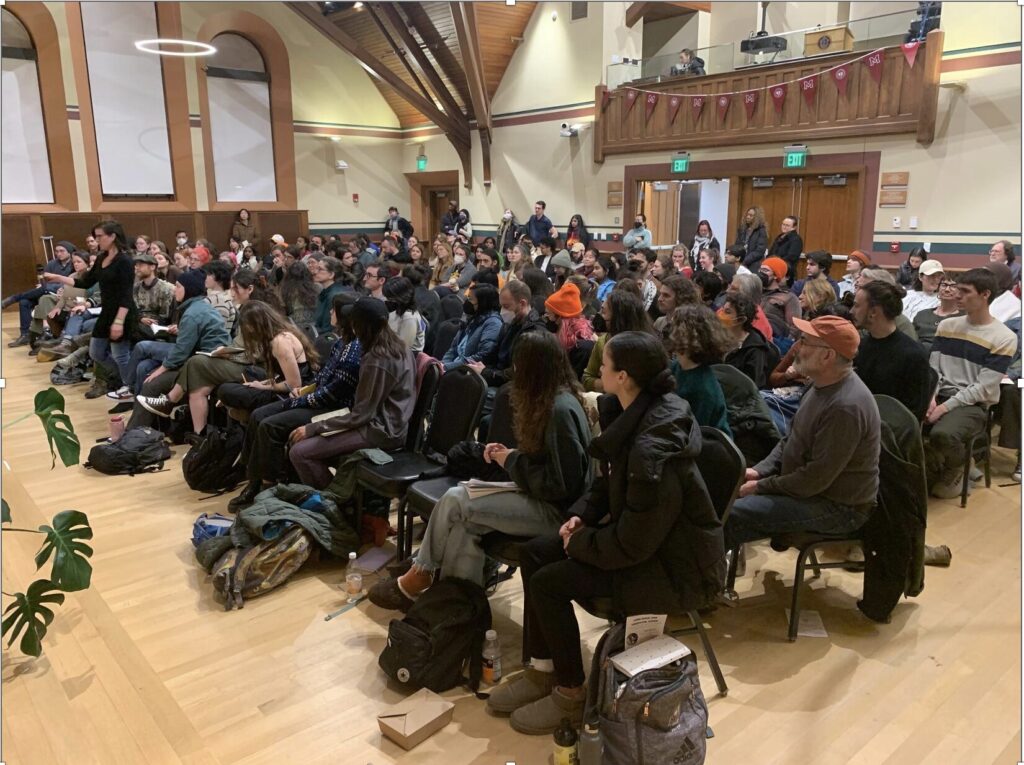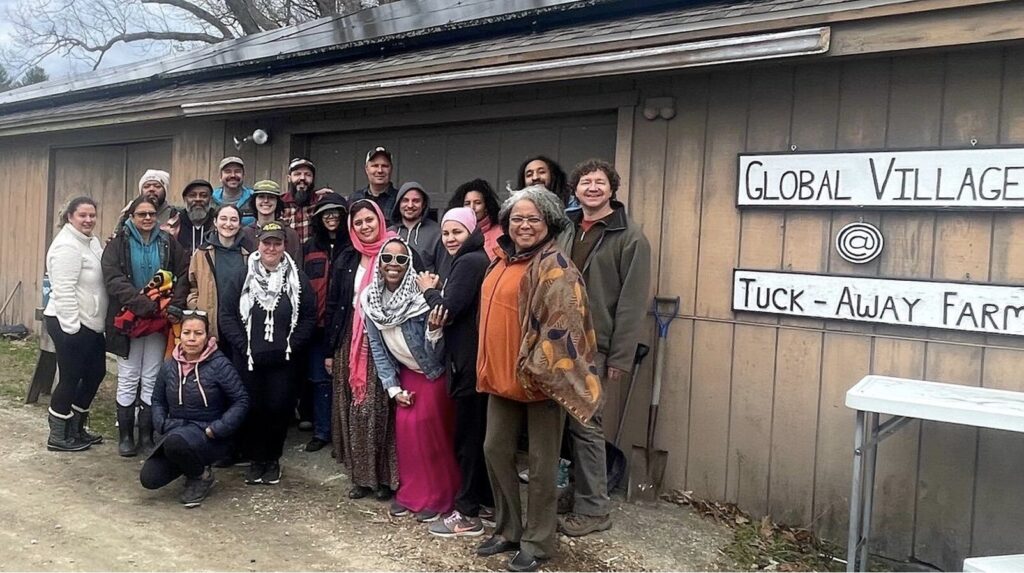Land Back and Liberated Zones at UMass Amherst

Presentation on Community Land Trusts at the UMass Old Chapel on February 20, 2024. Photo: Boone Shear
Becoming Human
by Boone Shear, Avery Conrad, and Juliana Greene
Late February of this year Kali Akuno from Cooperation Jackson and Ethan Miller from Land in Common took part in a public conversation at the University of Massachusetts Amherst. With over 200 students, faculty, and community members in attendance, Kali and Ethan shared with each other and the audience the history and politics of their organizations, the relationship between place-based and global politics, and the role of community land trusts and solidarity economies as part of a process of decommodification.
Community Land Trusts (CLT) take land out of the speculative market and away from individual ownership. CLT’s are most commonly discussed as a strategy for affordable housing. More fundamentally, CLT’s provide a means for communities to make creative decisions about how land is thought about, used, and developed. Land in Common and Cooperation Jackson both use community land trusts as a tool for decommodification—for stewarding, caring for and restoring relationships with and through land—as part of transformative politics of fighting for and building other worlds.
Cooperation Jackson uses their community land trust to help build a cooperative economy in Jackson, Mississippi that includes worker-cooperatives, community gardens, cooperative housing, a community production center, thing-swaps, and free stores and other forms of mutual aid; a growing solidarity economy that is part of a broader strategy for Black self-determination and collective liberation. Their community land trust is a means to meet needs of the community, build non-capitalist relationships, and build power. Land in Common is located on unceded Wabanaki lands in what is colonially known as Greene, Maine. Land in Common’s community land trust is designed to move land towards indigenous and other black and brown communities. Land in Common directly returns colonially occupied land to indigenous stewardship, creates land access and stewardship for excluded communities, and engages in public education and movement building.
A politics of land decommodification is integral to revolutionary struggle. As Miller relates, under capitalism, land—a living web of human and non-human relationships that sustain life—is transformed into an object and placed into a “hostage” situation through private ownership. Transforming this perverse formation into relational livelihoods involves both (re) establishing embodied practices through collaborative stewardship and carefully attending to the colonially structured relations and traumas that converge in particular places. “For [Cooperation Jackson]”, Kali explains, “a part of decommodification is figuring out and eventually creating a role where we can be stewards in the lands where Black people have become the majority but with the tacit recognition that we’re trying to work towards a larger project of Indigenous sovereignty. And we just need to play a particular part of exercising self-determination within a broader no-state framework.”
In April, Land in Common and Cooperation Jackson again came together as part of a Land Gathering in Grafton, Massachusetts to further build and deepen relationships along with leaders and members from Community Movement Builders, Cooperation Vermont, and host Global Village—about 25 people all together. Over the course of two days of facilitated conversations, shared meals, and lots of informal open space, participants began to get to know each other and build trust through slow, careful conversations necessary for real relationship building that too often gets subordinated in favor of felt urgencies to find shared values and theory, or to get into a coordinated strategic alignment. On the first night, this core group was joined by an additional seventy-five organizers and community members for a “fish-bowl” conversation, dinner, and singing and dancing before returning the next day for more small, intimate conversations. The organizations are continuing their conversations and collaborations through a nascent affiliation Northeast Solidarity for Land and Liberation and plans are being made for future gatherings and mutual aid.

Each edition of Becoming Human features an article, reflection, interview, poetry, or other types of expression that engage with a creative community or municipal effort. These will include original features that discuss a local initiative and also stories about efforts in other parts of the world that we might learn from. The growing narratives, relations, and power from which other worlds are being assembled, maybe, can help reorient our hope and desire—and resignation—away from the death drive of white supremacist, heteronormative, capitalist modernity, and towards an open, uncharted horizon of radical egalitarianism and towards the reality that other worlds are in the making or already here. For the full introduction to Becoming Human that appeared in its inaugural column, look here. For a listing a previous columns, look here.
Acknowledgements: This column is in dialogue and solidarity with numerous collaborators and comrades including Vin Lyon-Callo, Meredith Degyansky, Penn Loh, Deborah Keisch, Stephen Healy, students in Anthropology 340 – Other Economies are Possible, Anthropology 341 Building Solidarity Economies, Anthropology 597CC Community, Commons, Communism, and the pluriverse of world-making and world-defending efforts, movements, and projects in Massachusetts and around the worlds.
